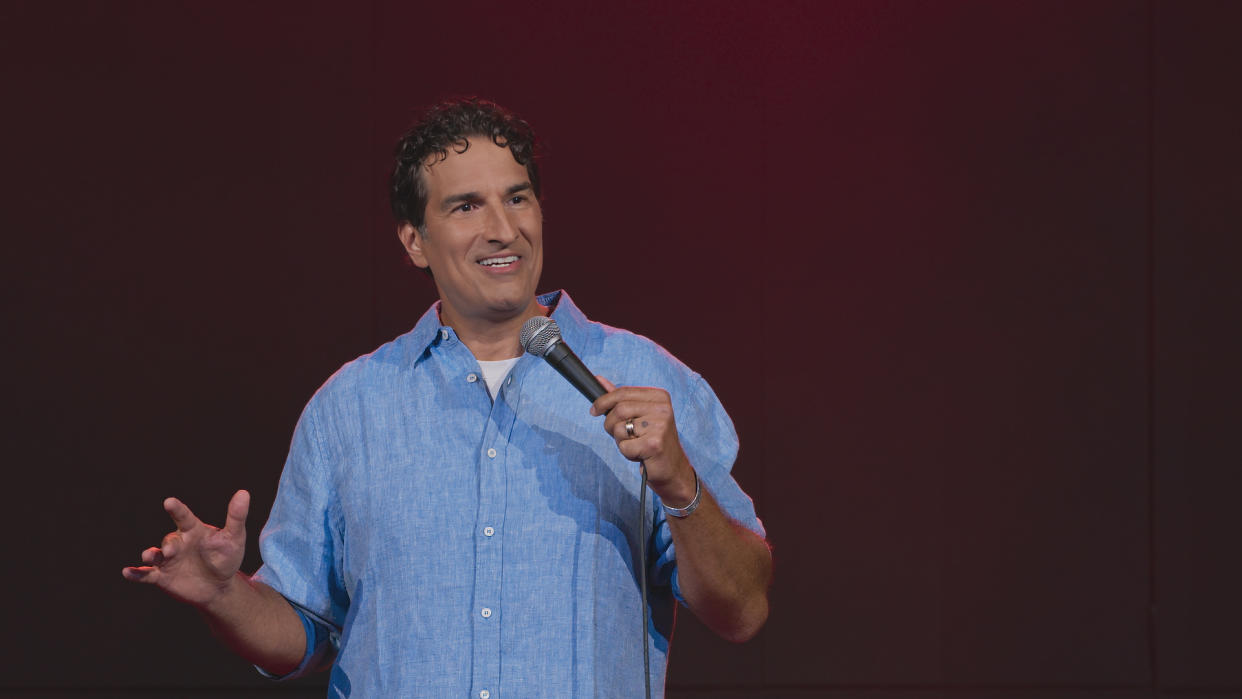Everything Changed After Gary Gulman Opened Up About His Depression, but He Still Can’t Stop Thinking About Pop-Tarts

Viewers watching “Gary Gulman: Born on Third Base” won’t have to wait long to hear something they can’t find in any other stand-up comedy special. Ten minutes into a routine about the economics of Pop-Tarts and his frustration with Jerry Seinfeld’s excessive wealth, the 53-year-old comic decides to reveal his exact net worth to the audience. He’s worth $89,000 — assuming you count his apartment security deposit as an asset.
It’s somewhat familiar territory for the comedian, who has long been known for his rampant self-deprecation and willingness to poke fun at billionaires. He used to periodically interrupt his own stand-up sets to remind the audience of his own name, and was cracking jokes about Donald Trump’s tendency to exaggerate his wealth years before the former president entered politics. But offering candid details about his private life is still a new experience for Gulman.
More from IndieWire
Over the past 20 years as a road comic, Gulman has established himself as your favorite comedian’s favorite comedian. His stand-up sets have traditionally focused on observational topics, using his large vocabulary to craft immaculately worded diatribes about desserts and 1980s pop culture that managed to be pointed without delving into vulgarity. He launched his career in the early 2000s with passionate rants explaining why he hates sugar cookies and admires Fig Newtons for straying from its fig-centric branding. In more recent years, a bit in which he details an elaborate fictional documentary about the people in charge of coming up with postal abbreviations for the 50 states has become the stuff of legend among comedy geeks.
While mainstream success often evaded him, Gulman built a cult following with his observations while keeping the details of his private life hidden. But that changed forever in 2019 when he released “The Great Depresh.” The Judd Apatow-produced HBO special saw Gulman detailing his lifelong struggles with depression, including a year in which he moved back home to Massachusetts and considered giving up comedy altogether. It was a wildly personal work from a comic who had spent his career leaning into the universal — and earned him the biggest mainstream recognition of his career.
When it was time to start writing material for his next special, Gulman knew there was no way he could fully put the genie back in the bottle and go back to making detached observations. But he still had a lot of thoughts about pre-packaged desserts that merited sharing. His latest, “Born on Third Base,” splits the difference between the two approaches. Gulman uses his trademark food humor to craft a story about his working class upbringing that turns into a spirited defense of social safety nets and a denouncement of America’s class divide. It’s a logical artistic evolution for the comic, and Gulman knows that none of it would be possible without the success of “The Great Depresh.”
“I went from being strictly observational, very superficial in terms of the level of vulnerability. And then I went all the way to the high diving board in terms of vulnerability and the weight of the material,” Gulman told IndieWire during a recent conversation. “Seeing that I didn’t lose audience members, I gained audience members gave me a push in the direction of feeling safer about going into areas that aren’t necessarily light. To tackle topics that are a little more weighty, income inequality and class and things like that. I met a challenge, and that gave me a lot of confidence that I could challenge myself again.”

The new special, which hails from executive producer Conan O’Brien, begins with a classic Gulman bit in which he mocks the makers of Pop-Tarts for failing to frost the perimeter of each pastry after seemingly having no problem covering the other 90 percent. The discussion of toaster pastry manufacturing gives him an opportunity to explain how he relied on free school breakfasts as a child — while revealing that he’s still angry about only receiving one Pop-Tart each morning instead of two.
“I was almost strictly a food-based comic. And then I wanted to switch because I didn’t want to be known for one thing. But I always like to do jokes that can stand in for something bigger,” he said. “For me, Pop-Tarts were this thing that I loved and relished eating, and was this thing that also intersected with my working class background. We would get free lunch, and they would give us a Pop-Tart, and I remember being outraged because I was aware that Pop-Tarts came in packages of two. They were trying to pull one over on us! So it was really natural for me to make that something that would fit within my story.”
Gulman says that he made a conscious choice to lean into the topic of class after seeing a tweet pointing out that no comic since George Carlin had seriously addressed the issue. But the topic had been subtly popping up in his comedy throughout his entire career. His artistic progression becomes apparent when comparing two bits about one of his favorite topics: Chipotle Mexican Grill.
In his 2012 special “In This Economy,” Gulman made fun of himself by quipping that his ability to eat at the fast casual restaurant was contingent on him sporadically finding $20 bills in old coats. He joked that his ego was always bruised when employees felt compelled to notify him that guacamole came with an extra charge, wondering aloud if his poor sense of fashion gave the impression that he “couldn’t cover the guac.”
Gulman returns to the topic of Chipotle in his new special — though the chain’s spike in popularity over the past decade means he no longer has to pronounce the “Mexican Grill” every time he mentions it. This time around, his approach is less self-deprecating and more opinionated. He chides obnoxious customers for having the gall to reach over the glass to point at the corn while ordering their burritos, eventually delivering a full-throated call for everyone to be nicer to service industry workers. Gulman says that when he pivoted to writing about income inequality, his longtime Mexican food muse was one of the first things that occurred to him.
“From the beginning, I was trying to write something different than anyone else was writing. And I found early on, within the first few years of starting comedy, that most comedians, especially most male comedians, were denigrating whatever topics they had chosen. And so I found if I could say something positive about an area, then I would be different,” Gulman said when asked about his lifelong fascination with Chipotle. “So when I discovered Chipotle and the food and the service appealed to me, I decided I’d address this from the standpoint that I won’t be criticizing it, I’ll be lauding it and take a more reverential tone. And when I found that I wanted to write something about class, it was very apparent that I was on to something. Because there’s a very certain way that we treat not just Chipotle, but everyone that is working in our service industries.”
The new Gary Gulman might be more confident in expressing his views and telling his own story, but he’s still the same person who made a career out of laughing at the minutia of mass-produced foods and middle class existence. The latest special is simply an extension of his biggest talents: his impeccable eye for detail and his ability to chuckle at his own shortcomings.
“I was lauded for being vulnerable for talking about my lifelong struggle with mental illness. But to me, it felt much more vulnerable to tell everybody, especially people that know me, that I’m not even worth a hundred thousand dollars,” he said with a laugh.
“Gary Gulman: Born on Third Base” is now streaming on Max.
Best of IndieWire
Quentin Tarantino's Favorite Movies: 60 Films the Director Wants You to See
Where to Watch This Week's New Movies, Including 'The Iron Claw' and 'All of Us Strangers'
2023 Movies Shot on Film: From 'Oppenheimer' to 'Killers of the Flower Moon' and 'Maestro'
Sign up for Indiewire's Newsletter. For the latest news, follow us on Facebook, Twitter, and Instagram.


